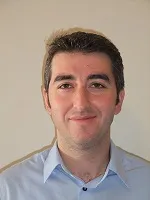Non-coherent Two-way Relaying with Amplify-and-Forward: Performance Bounds
Dr. Zoran Utkovski
University Goce Delcev in Stip, Macedonia
Abstract:
The talk addresses the two-user MIMO block fading two-way relay channel in the non-coherent setting, where neither the terminals nor the relay have knowledge of the channel realizations. We introduce the problem and elaborate on the number of degrees of freedom of the channel in some special cases. Since the problem of derivation of performance limits for these types of channels is still open, in this first attempt we define the problem and present insights about the information-theoretic techniques which are relevant to the problem. The analysis is based on the geometric approach introduced for the non-coherent point-to-point MIMO channel. Finally, we present relations with other open problems in the field of non-coherent communication, such as the Multiple Access Channel and the Random Access Channel.
Biography:
Zoran Utkovski received his Ph.D. (Dr.-Ing) degree (with distinction) from the University of Ulm in 2010, his M.Sc. (with distinction) from Chalmers University of Technology in Gothenburg, Sweden in 2004 and his Dipl.-Ing. degree from the Ss. Cyril and Methodius University in Skopje in 2000. Currently, he is Assistant Professor at the Faculty of Computer Science at the University Goce Delcev in Stip, Macedonia. Since 2011 he is also with the Laboratory for Complex Systems and Networks at the Macedonian Academy of Sciences and Arts, where he is a research group leader. His research interest is mainly in communication and information theory. He works on coding for non-coherent communication in wireless systems and analysis of the performance limits of wireless networks. His further interests include cooperative communications, protocol coding and information geometry. He is coauthor of a paper awarded the best poster award at the IEEE Communication Theory Workshop in 2010. He is national representative in the Management Committee of the COST IC1004 Action “Cooperative Radio Communications for Green Smart Environment” and of the COST IC1101 Action “Optical Wireless Communications - An Emerging Technology.” He is member of the IEEE Information Theory Society and author of over 20 publications in major IEEE conferences and journals.
